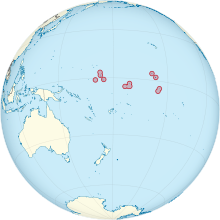
Kiribati, officially the Republic of Kiribati, is an island country in the Micronesia subregion of Oceania in the central Pacific Ocean. Its permanent population is over 119,000 as of the 2020 census, with more than half living on Tarawa atoll. The state comprises 32 atolls and one remote raised coral island, Banaba. Its total land area is 811 km2 (313 sq mi) dispersed over 3,441,810 km2 (1,328,890 sq mi) of ocean.

Politics of Kiribati takes place in a framework of a parliamentary representative democratic republic, whereby the Beretitenti, President of Kiribati, is both the head of state and head of government, and of a multi-party system. Executive power is exercised by the government, Beretitenti, and his cabinet, all MPs. Legislative power is exercised by the House of Assembly. The Judiciary of Kiribati is independent of the executive and the legislature. The Constitution of Kiribati, promulgated at independence on 12 July 1979, establishes the Republic of Kiribati as a sovereign democratic republic and guarantees the fundamental rights of its citizens and residents.

The Court of Appeal of New Zealand is the principal intermediate appellate court of New Zealand. It is also the final appellate court for a number of matters. In practice, most appeals are resolved at this intermediate appellate level, rather than in the Supreme Court. The Court of Appeal has existed as a separate court since 1862 but, until 1957, it was composed of judges of the High Court sitting periodically in panels. In 1957 the Court of Appeal was reconstituted as a permanent court separate from the High Court. It is located in Wellington.

William Kenneth Hastings is a Canadian-born judge who served as the tenth Chief Censor of New Zealand from October 1999 to July 2010. He was chairman of the Immigration and Protection Tribunal from July 2010 until February 2013, and is currently a District Court Judge. He was the chair of the Broadcasting Standards Authority from October 2018 until August 2021. He was sworn in as the tenth Judge of the Court Martial of New Zealand on 20 July 2021. On 9 August 2021, Hastings was sworn in as Chief Justice of the Republic of Kiribati, a position he held until 8 December 2022. He was a member of the Supreme Court and Court of Appeal of Vanuatu from July 2023 to June 2024.

Employment tribunals are tribunal public bodies in both England and Wales and Scotland that have statutory jurisdiction to hear disputes between employers and employees.

Singh v Canada (Minister of Employment and Immigration), [1985] 1 S.C.R. 177 is a 1985 case of the Supreme Court of Canada. It determined that refugee claimants had a constitutional right to an oral hearing, by the principles of fundamental justice. The judgment was an early decision under the Canadian Charter of Rights and Freedoms and was also decided under the Canadian Bill of Rights. It had a significant impact on immigration law, human rights law, constitutional law, and administrative law in Canada. The Singh decision resulted in amnesty being granted to tens of thousands of refugee claimants and sweeping reforms which gave Canada one of the most liberal and most expensive refugee systems in the world. The anniversary of the ruling, 4 April, has been observed in Canada as Refugee Rights Day.

The High Court of New Zealand is the superior court of New Zealand. It has general jurisdiction and responsibility, under the Senior Courts Act 2016, as well as the High Court Rules 2016, for the administration of justice throughout New Zealand. There are 18 High Court locations throughout New Zealand, plus one stand-alone registry.
The New Zealand Refugee Status Appeals Authority or RSAA, was an independent authority that heard the appeals of people who had been declined refugee status by the Refugee Status Branch of the New Zealand Immigration Service. It was established in 1991, and was replaced by the Immigration and Protection Tribunal in 2010. New Zealand established the RSAA as part of its responsibility to uphold the right of asylum as a result of being a signatory of the 1951 Convention relating to the Status of Refugees and the 1967 Protocol. The decisions of the RSAA are not binding, but have had a significant impact on refugee jurisprudence.
Immigration New Zealand, formerly the New Zealand Immigration Service (NZIS), is the agency within the New Zealand Ministry of Business, Innovation and Employment (MBIE) that is responsible for border control, issuing travel visas and managing immigration to New Zealand.

Kurt John Owen v The Queen [2007] NZSC 102 is a decision of the Supreme Court of New Zealand handed down on 11 December 2007. It concerned the grounds for appeal in section 385(1)(a) of the Crimes Act 1961.

Administrative law in Singapore is a branch of public law that is concerned with the control of governmental powers as exercised through its various administrative agencies. Administrative law requires administrators – ministers, civil servants and public authorities – to act fairly, reasonably and in accordance with the law. Singapore administrative law is largely based on English administrative law, which the nation inherited at independence in 1965.
Tuvalu is a small island nation in the South Pacific, located North of Fiji and North West of Samoa. The population at the 2012 census was 10,837. Tuvalu has a written constitution which includes a statement of rights influenced by the United Nations Universal Declaration of Human Rights and the European Convention on Human Rights. While most human rights in Tuvalu are respected, areas of concern include women’s rights and freedom of belief, as well as diminishing access to human rights in the face of global warming. The latter has played a major role in the implementation of human rights actions in Tuvalu given its geographical vulnerability and scarce resources.
The Immigration and Protection Tribunal is a specialist, independent tribunal established in New Zealand under the Immigration Act 2009 with jurisdiction to hear appeals and applications regarding residence class visas, deportation, and claims to be recognised as a refugee or as a protected person. The Tribunal is administered by the Ministry of Justice and is chaired by a District Court Judge, appointed by the Governor General on the recommendation of the Attorney-General.

Taylor v Attorney-General[2015] NZHC 1706 is a New Zealand High Court judgment which made a formal declaration that a statute that prohibited prisoners from voting is inconsistent with the New Zealand Bill of Rights Act 1990. The action was brought by Arthur Taylor, a high-profile prison inmate. This was the first time a court had recognised that a formal declaration of inconsistency is an available remedy for statutory breaches of the Bill of Rights. Section 5 of the Bill of Rights Act states, "Subject to section 4, the rights and freedoms contained in this Bill of Rights may be subject only to such reasonable limits prescribed by law as can be demonstrably justified in a free and democratic society." In his decision, Justice Heath declared that the Electoral Amendment Act 2010 which stripped all voting rights in general elections from prisoners was an unjustified limitation on the right to vote contained in s 12 of the Bill of Rights. The Court of Appeal upheld this decision after the Attorney-General appealed the jurisdiction of the courts to make declarations of inconsistency.

The Judiciary of Kiribati is the branch of the Government of Kiribati which interprets and applies the laws of the country. In addition to the Constitution of Kiribati and the corpus of laws, the laws of Kiribati include customary law, which the courts must take into account when considering specified matters in criminal and civil proceedings.

Terranova Homes, also styled as TerraNova Homes and sometimes referred to as Terranova v Bartlett, was a decision of the New Zealand Court of Appeal concerning equal pay for women, and turned on the interpretation of the Equal Pay Act 1972, which was enacted in response to the 1971 report of the Commission of Inquiry into Equal Pay. It was alleged that the wages paid by TerraNova Homes & Care Ltd to its caregivers were lower than they would be if care giving of the aged were not work predominantly performed by women. O'Regan P, Stevens and French JJ upheld the Employment Court's decision in Service and Food Workers Union Nga Ringa Tota Inc v TerraNova Homes and Care Ltd that TerraNova was discriminating against its female employees. The Court of Appeal dismissed the appeal, although they thought that the issue was more "finely balanced" than the Employment Court had illustrated in its decision.

In the case of Meadows v Minister for Justice, Equality, and Law Reform [2010] IESC 3; [2010] 2 IR 701; [2011] 2 ILRM 157, the Supreme Court of Ireland found that the proportionality test should be used when reviewing administrative actions that implicate fundamental rights protected by both the Irish Constitution and the European Convention on Human Rights. While the case concerned an application for judicial review of an asylum decision, the decision was described as carrying “implications for the whole body of Irish administrative law”.

Chen Shi Hai v MIMA, also known as 'Chen' is a decision of the High Court of Australia.

A constitutional crisis began in Kiribati when the Cabinet of Kiribati suspended two of its High Court Justices. High Court Judge David Lambourne was suspended in May 2022 while Chief Justice Bill Hastings was suspended on 30 June 2022, both over allegations of misconduct. A Court of Appeal ruling upheld an earlier ruling of Chief Justice Hastings that the government acted unconstitutionally in not permitting David Lambourne to resume his duties as a High Court judge, and overturned the subsequent attempted deportation of Lambourne. In response, the government suspended all judges of the Kiribati Court of Appeal on 6 September 2022.
David Lambourne is an Australian judge on the courts of Kiribati since 1995, first as Kiribati People's lawyer (1995–1999), solicitor general, then, since July 2018, as puisne judge Justice in the High Court of Kiribati. He is the husband of Tessie Eria Lambourne, leader of the opposition since 2020.












